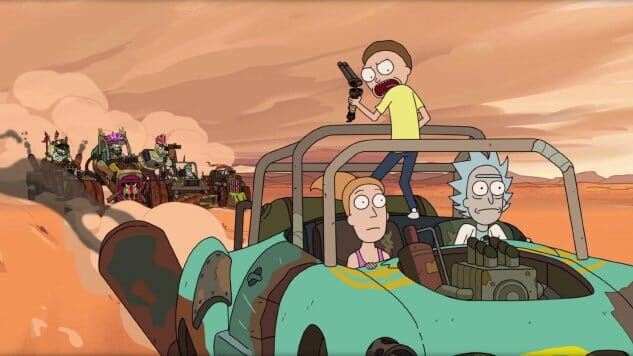Rick and Morty Makes a Bleak but Surprisingly Heartwarming Return
Episode 3.02: “Rickmancing the Stone”

Tonight’s episode of Rick and Morty, and the rest of Season 3, is really just gravy—or should I say saucy? Now that Justin Roiland has received McDonald’s’ fabled 1998 Mulan Szechuan Sauce, the series arc Rick announced at the end of “The Rickshank Rickdemption” is complete, and we can all just go to bed early on Sunday nights.
I should leave the jesting to the R&M crew. They’re better at it, and besides, they did introduce a real, live narrative that we’ll be able to follow down into the abyss as this run of episodes unfolds: Beth and Jerry’s (inevitable) divorce. “Rickmancing the Stone” takes this development head-on, dropping Rick, Morty and Summer into a Mad Max-1990s hybrid wasteland so they can deal with their family’s destruction in a setting that has literally been destroyed. Poor Beth doesn’t get to come along, left to handle her emotions on regular old Earth C-137; even poorer Jerry is busy being called a “loser” by the wind (which turns a legitimately depressing moment into one of the episode’s better laughs).
Out of the characters’ responses to the divorce, Summer’s is the most compelling. Roiland, Dan Harmon and company appear intent on developing Morty’s sister into more than just a teen girl archetype this season, and it’s working wonders for them so far. We’ve seen her get violent (and brutally so!) before, but in “Rickmancing the Stone,” Summer’s got an overarching attitude to match. Without the petty distractions of civilized life to get in her way and provide artificial stabilization—least of all her family—she’s able to let loose and play out her teenage nihilist fantasy, which includes a Rick-like “not because you told me to” execution. But Summer, unlike her Grandpa Rick, proves incapable of committing to caring about nothing; it’s her oxymoronic passion for toxic nihilism that eventually drives a wedge between her and her post-apocalyptic boyfriend, Hemorrhage (Joel McHale, reunited with Harmon). She can only pull off apathy as a performative act, and only when the purpose is to create a closer bond with someone she likes: first Rick, then Hemorrhage, and finally, in the episode’s sweet ending, Jerry. Here, Rick and Morty uses Summer to reaffirm one of its core themes, namely the idea that realizing the world is bullshit opens up a door for sincerity in human relationships, and ignoring that door will only drive us crazy. That Summer can represent this value while kicking serious ass suddenly puts her in the running for the show’s second-best character (assuming no one could unseat Rick).
Meanwhile, Rick would be more or less content to leave Summer behind once he’s gotten his isotope 322. “You have infinite sisters,” he reminds Morty—it’s just that looking for a replacement would sidetrack whatever his plans are to distract himself from peering into his empty soul. “Rickmancing the Stone” serves as an important reminder that although Rick genuinely cares about his family, there’s ordinarily (63/64ths of the time) a hard limit on that concern where it abuts his chaotic self-interest. Here, that interest is in avoiding drama at all costs…but Rick can’t science a solution to his daughter’s real emotional trauma. The Morty and Summer robots are a comedic highlight of the episode—”Ah jeez, my sister died in the spaghetti” got a huge laugh out of me—but they also reveal an important, twofold truth. First, Rick’s got a long way to go to fulfill what I think is the sincere goal of reconnecting emotionally with Beth; he barely understands her. Second, Rick needs this specific Morty and Summer to achieve that goal. What starts as an incredibly bleak episode, therefore, turns into one of the most heartwarming and hopeful in Rick and Morty history by its end. “Rickmancing the Stone” is a message about how a major family catastrophe can actually produce healthier, happier relationships out the other side, and it’s therefore best to rip off the bandages holding the dysfunctional, Jerry-rigged (ayooooo) Smiths together. Creation through destruction has always been a hallmark of Harmon’s stories, and the grotesque, absurd situations in which Rick and Morty allows that to play out—Rick helps Morty let go of his resentment toward Jerry via a cute, grandfather-grandson strangling, for instance—make the show his best vehicle yet.